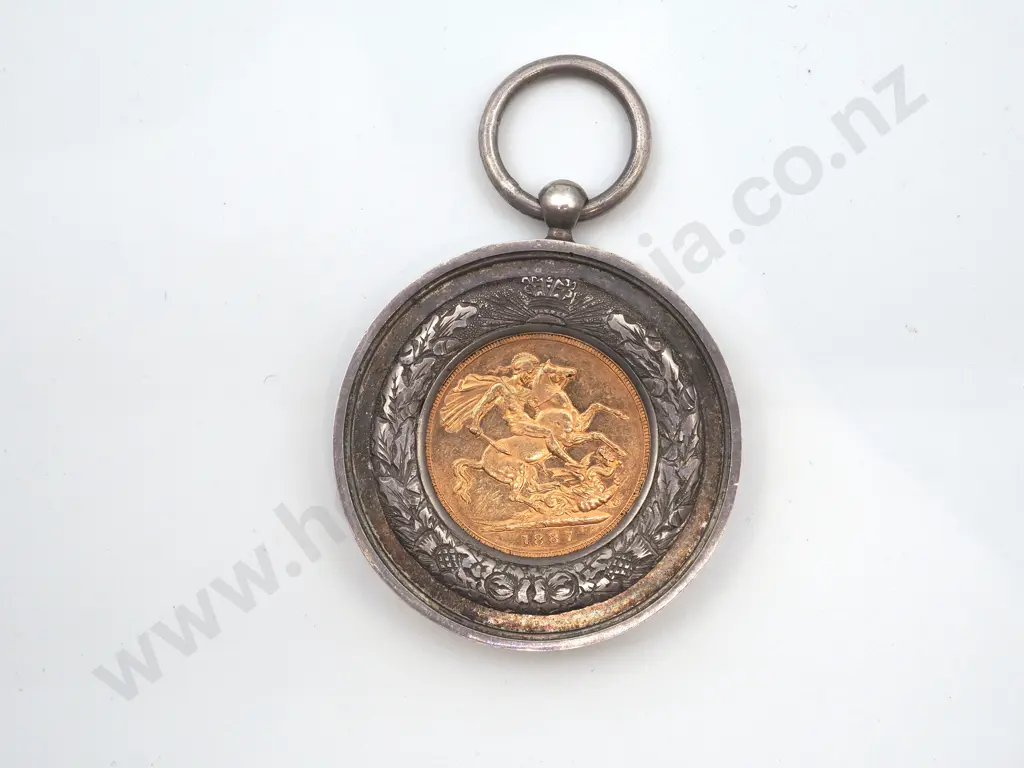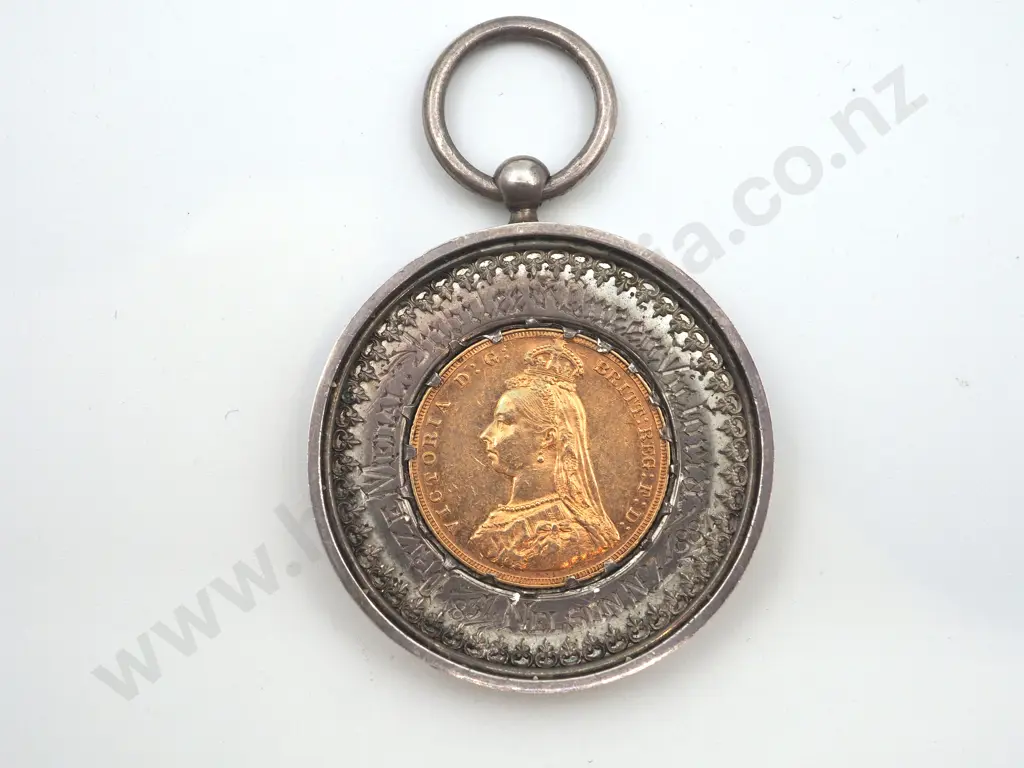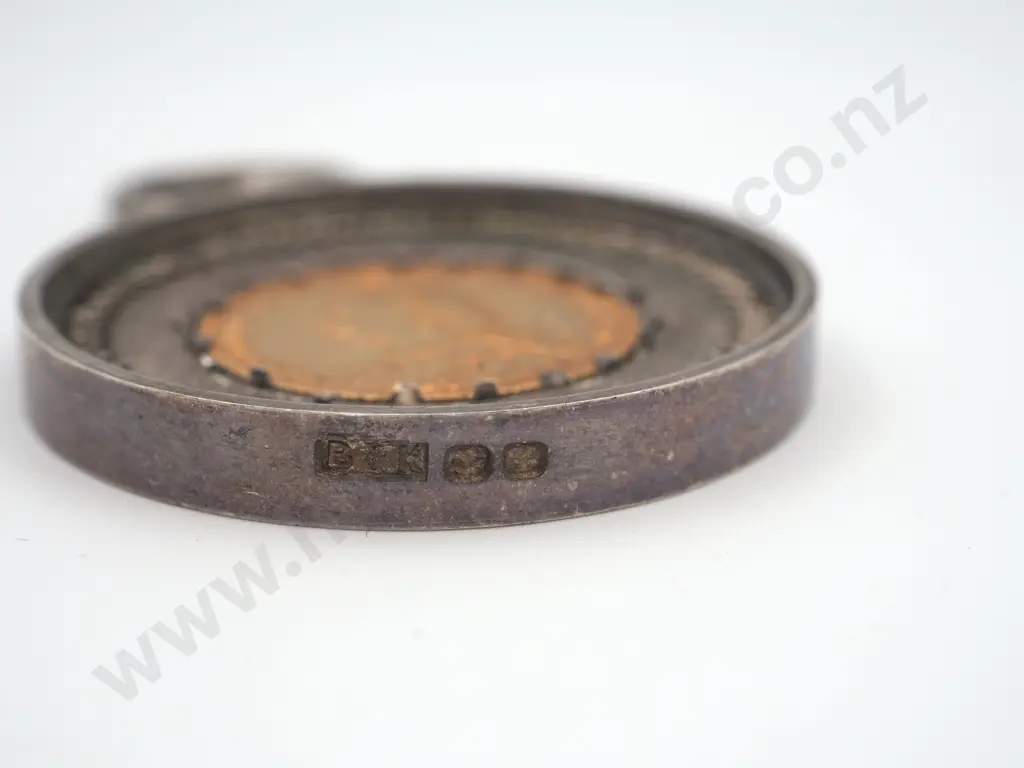The New Zealand Auction Saturday, 31 August 2024 / 11:00 am start
Nelson Queen Victoria Jubilee Prize Medal by Brown & Kerr
Lot Details
Size: 5.5cm Weight: 30.5g Handcrafted in sterling silver with an 1887 gold sovereign inset, by B&K (Brown & Kerr, Nelson), ring top suspension, obverse inscribed 'Prize Medal/Jubilee of Queen Victoria/1837.1887/Nelson N.Z. Although it is unclear what the medal was presented for, the following note on the manufacture and presentation of similar medals has been found courtesy of National Library of New Zealand - Papers Past - from the 'Nelson Evening Mail' Thursday, 23rd June 1887: "......The gold medal and clasp presented to Mr Crisp on Tuesday was the work of Messrs Brown and Kerr, on whom they reflect much credit. On one side of the medal, encircled by a floral border, are the letters B.C. in a monogram, and on the reverse: 'Jubilee medal, presented to B.Crisp by the people of Nelson, June 21, 1887.' The same firm turned out the second class competitive medals, which consist of a half sovereign set in a silver border on one side, while on the other are the words 'Jubilee of Victoria, 1887. Prize Medal, Nelson, N.Z.' ......" The following from Te ara, the Encyclopaedia of New Zealand. "Benjamin Crisp was born in London, England, probably on 11 May 1808, the son of Sophia Crisp and her husband, Benjamin, a tinsmith. He left England in 1819 for Australia, where he worked as a whaler, farm worker, and bullock driver. In 1837 he moved to New Zealand, joining a whaling party on the Kāpiti coast and then working as a boatman at Port Nicholson (Wellington). Crisp crossed to Nelson in early 1842 and teamed up with Sam Phelps, a bullock driver who had been notorious in Port Nicholson for naming his bullocks after local magistrates. Their use of a bullock dray to transport the luggage of immigrants from the port to the town brought them into competition with Alfred Saunders, who had been selling wheelbarrows for the same purpose. Business was brisk and so profitable that they needed to work in the mornings only. Afternoons were spent drinking and then sleeping off the results under their dray. One day in August 1842 Crisp had been so drunk that he had walked out of Wright's public house and straight into the tideway, under the impression that he was going over a bridge. On Sundays Alfred Saunders, founder of the Nelson Temperance Society, used the bullock dray as a platform for his temperance addresses. These had their effect on Crisp, who called on Saunders at 4 a.m. one morning in June 1843 to repent his intemperate ways and sign his name in the pledge book. Saunders came to regard him as his most valuable convert, with the possible exception of the politician William Fox. Crisp married Elizabeth Burnett in Nelson on 14 December 1846; they raised five daughters and five sons, whom their father would exhibit at temperance meetings as healthy specimens of teetotalism. It was with the children of Nelson that Ben Crisp was to have his greatest influence. He founded a Band of Hope to provide wholesome amusement for them, was active in the Sunday school, and dedicated 50 years to their welfare. The band was always at the forefront of public occasions, with upwards of 500 children turning out to welcome important visitors. George Grey was particularly taken with their activities and contributed towards their annual Queen's Birthday treats. On these occasions the children would gather at the Temperance Hall for the festivities which Crisp had organised. A parade around the town would be followed by games and then prodigious quantities of buns and cakes would be consumed. Proceedings would end with lantern slides, the favourite being of a man swallowing rats. Ben Crisp was regarded with great affection by the whole community, being universally referred to as 'good old Ben Crisp'. Saunders was struck by his 'fine head and honest face and manners; his good English, so entirely free from any county dialect.' He was presented with a gold medal and a purse of 60 sovereigns during celebrations for the 1887 Jubilee. On his death at Nelson on 2 September 1901 he was accorded a public funeral. His headstone reads, 'Erected by the Nelson citizens in memory of Ben Crisp who was the children's friend'."




